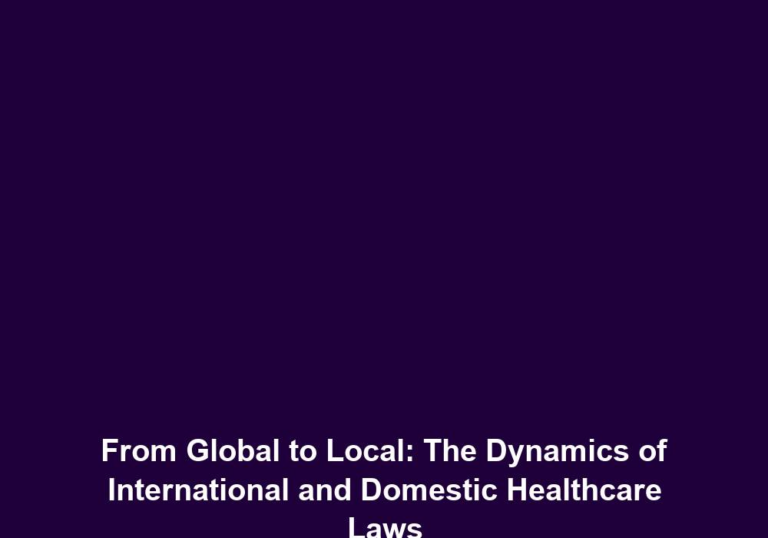Bridging Borders: Understanding International vs. Domestic Healthcare Legislation
In today’s globalized world, it is crucial to understand the differences between international and domestic healthcare legislation. As countries strive to provide quality healthcare services to their citizens, various regulations and policies are put in place to ensure the smooth functioning of healthcare systems. This article aims to shed light on the key aspects of international and domestic healthcare legislation, highlighting their similarities and differences.
Introduction to International and Domestic Healthcare Legislation
International Healthcare Legislation
International healthcare legislation refers to the regulations and policies that govern healthcare practices at a global level. These laws are typically established by international organizations such as the World Health Organization (WHO) and are designed to promote universal access to quality healthcare, regardless of geographic location.
International healthcare legislation plays a crucial role in setting global standards for healthcare practices. It addresses various aspects of healthcare, including patient safety, quality assurance, ethical considerations, and regulation of healthcare professionals. By establishing universal standards, international healthcare legislation aims to ensure that individuals receive consistent and high-quality healthcare services, regardless of where they are in the world.
Domestic Healthcare Legislation
On the other hand, domestic healthcare legislation pertains to the regulations and policies implemented within a specific country or region. These laws are formulated by the respective government bodies and aim to address the unique healthcare needs and challenges faced by the population.
Domestic healthcare legislation takes into account the specific healthcare concerns and priorities of a country or region. It focuses on issues such as healthcare financing, healthcare delivery models, and the regulation of healthcare professionals within the country. By tailoring legislation to the local context, domestic healthcare legislation aims to address the specific healthcare challenges faced by the population and ensure the provision of quality healthcare services.
Key Similarities between International and Domestic Healthcare Legislation
While international and domestic healthcare legislation may differ in their scope and application, there are several similarities that underpin both systems:
- Patient Safety and Quality Assurance: Both international and domestic healthcare legislation prioritize patient safety and ensure that healthcare providers adhere to quality standards in their practices. This includes regulations related to infection control, medication safety, and medical equipment usage.
Ensuring patient safety and quality assurance is a shared goal of both international and domestic healthcare legislation. Both systems have regulations in place to safeguard patients from harm and ensure that healthcare providers deliver high-quality care. This includes guidelines on infection control practices, medication safety protocols, and standards for the use and maintenance of medical equipment.
- Ethical Considerations: Both international and domestic healthcare legislation emphasize ethical considerations in healthcare delivery. This includes guidelines for informed consent, patient confidentiality, and protection of vulnerable populations.
Ethical considerations play a crucial role in healthcare delivery, regardless of the setting. Both international and domestic healthcare legislation recognize the importance of respecting patients’ autonomy, confidentiality, and rights. This includes guidelines on obtaining informed consent from patients, maintaining patient confidentiality, and ensuring the protection of vulnerable populations such as children, the elderly, and individuals with disabilities.
- Regulation of Healthcare Professionals: Both systems have regulations in place to ensure the competency and accountability of healthcare professionals. This includes licensing requirements, continuing education, and disciplinary measures.
Regulating healthcare professionals is essential to maintain the quality and integrity of healthcare services. Both international and domestic healthcare legislation establish requirements for healthcare professionals to obtain and maintain licensure. This includes educational qualifications, continuing education requirements, and mechanisms for addressing professional misconduct or negligence. By regulating healthcare professionals, both systems aim to ensure that patients receive care from qualified and accountable practitioners.
- Healthcare Financing: Both international and domestic healthcare legislation address the issue of healthcare financing, albeit in different ways. While international legislation focuses on promoting equitable access to affordable healthcare, domestic legislation often includes provisions for public and private health insurance schemes.
Healthcare financing is a critical aspect of healthcare systems, and both international and domestic legislation recognize its importance. International healthcare legislation advocates for equitable access to affordable healthcare for all individuals, regardless of their financial status. This includes promoting universal health coverage and advocating for publicly funded healthcare systems in countries that can afford it. On the other hand, domestic healthcare legislation takes into account the specific healthcare financing models within a country, which may include a combination of public and private health insurance schemes to ensure access to healthcare services.
Key Differences between International and Domestic Healthcare Legislation
While there are similarities, it is important to recognize the unique aspects of international and domestic healthcare legislation:
- Scope of Application: International healthcare legislation applies to all countries and aims to set global standards for healthcare practices. In contrast, domestic healthcare legislation is specific to a particular country or region and is tailored to address the unique healthcare needs of its population.
International healthcare legislation has a global scope and seeks to establish universal standards for healthcare practices worldwide. It applies to all countries and aims to ensure that individuals receive consistent and high-quality healthcare services, regardless of their geographic location. On the other hand, domestic healthcare legislation is limited to a specific country or region. It takes into account the unique healthcare needs, challenges, and priorities of the population within that specific jurisdiction.
- Enforcement Mechanisms: International healthcare legislation relies on voluntary compliance from member countries, whereas domestic healthcare legislation is typically enforced through regulatory bodies and legal systems within a country.
Enforcement mechanisms differ between international and domestic healthcare legislation. International healthcare legislation relies on voluntary compliance from member countries, as there is no supranational authority with direct enforcement powers. Compliance with international healthcare legislation is typically achieved through cooperation, peer pressure, and the influence of international organizations such as the World Health Organization. In contrast, domestic healthcare legislation is enforced through regulatory bodies and legal systems within a country. These bodies have the authority to monitor and enforce compliance with healthcare regulations, ensuring that healthcare providers and institutions adhere to the established standards.
- Healthcare Priorities: International healthcare legislation often focuses on addressing global health challenges such as infectious diseases, maternal and child health, and non-communicable diseases. In contrast, domestic healthcare legislation may prioritize specific healthcare concerns based on the needs of the population, such as chronic disease management or mental health services.
Healthcare priorities differ between international and domestic healthcare legislation. International healthcare legislation aims to address global health challenges that transcend national boundaries. This includes efforts to combat infectious diseases, improve maternal and child health, and address non-communicable diseases on a global scale. On the other hand, domestic healthcare legislation focuses on addressing the specific healthcare needs and challenges of the population within a particular country or region. This may include prioritizing healthcare concerns such as chronic disease management, mental health services, or other prevalent health issues within the population.
- Healthcare Financing Models: While both systems address healthcare financing, the specific models may vary. International healthcare legislation promotes universal healthcare coverage and often advocates for publicly funded healthcare systems. Domestic healthcare legislation, on the other hand, may include a mix of public and private financing models, depending on the country’s healthcare system.
Healthcare financing models differ between international and domestic healthcare legislation. International healthcare legislation promotes the concept of universal healthcare coverage, advocating for publicly funded healthcare systems where the government ensures access to healthcare services for all individuals. This approach aims to eliminate financial barriers to healthcare and ensure equitable access. In contrast, domestic healthcare legislation takes into account the specific healthcare financing models within a country. This may include a mix of public and private financing, depending on the country’s healthcare system. Some countries may have publicly funded healthcare systems, while others rely on a combination of public and private health insurance schemes to provide healthcare coverage.
Implications for Healthcare Professionals and Patients
Understanding the differences between international and domestic healthcare legislation is crucial for healthcare professionals and patients alike. Healthcare professionals must be aware of the legal and regulatory frameworks governing their practice, ensuring compliance with both international and domestic laws. This includes staying updated on any changes or updates in healthcare legislation that may impact their daily practice.
For patients, understanding the differences can help navigate healthcare systems, both domestically and internationally. It allows patients to make informed decisions about their healthcare choices, ensuring they receive safe and quality care regardless of where they seek treatment.
Conclusion
In conclusion, international and domestic healthcare legislation play a vital role in shaping healthcare systems worldwide. While there are similarities in promoting patient safety and quality assurance, the scope, enforcement mechanisms, healthcare priorities, and financing models differ between the two. By understanding these differences, healthcare professionals and patients can navigate the complexities of healthcare systems more effectively, ultimately contributing to improved healthcare outcomes.







